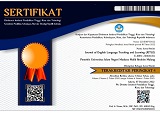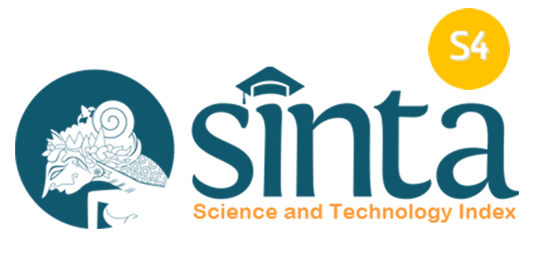I Feel Less Judged, so I Speak More : Introverted Students' Response on Online Learning Platforms in Speaking Class
Abstract
Full Text:
PDFReferences
Cain, Susan. (2013). Quiet: The Power of Introverts in a World That Can’t Stop Talking. 1st ed. New York: Broadway Books.
Davis, D., & Taft, R. (1976). A measure of preference for speaking rather than writing and its relationship to expressive language skills in adolescents. Language and Speech, 19(3), 224– 235. https://doi.org/10.1177/002383097601900303
Fitriani, Yustina, Murti Bandung, and Mohtana Kharisma Kadri. (2020). “Humanitatis Journal of Language and Literature Students ’ Perspective of Online Learning o n Speaking Class During Covid-19 Pandemic Humanitatis Journal of Language and Literature.” Humanitatis Journal of Language and Literature 7(1):1–12.
Glenn, Cynthia Wheatley. (2018). “Adding the Human Touch to Asynchronous Online Learning.” Journal of College Student Retention: Research, Theory and Practice 19(4):381–93.
Khan, Tahir Mehmood. (2020). “Use of Social Media and WhatsApp to Conduct Teaching Activities during the COVID-19 Lockdown in Pakistan.” The International Journal of Pharmacy Practice 2020.
Mulenga, Eddie M., and José M. Marbán. (2020). “Prospective Teachers’ Online Learning Mathematics Activities in the Age of COVID-19: A Cluster Analysis Approach.” Eurasia Journal of Mathematics, Science and Technology Education 16(9).
Rahman, Afzalur. (2021). “Using Students’ Experience to Derive Effectiveness of COVID-19- Lockdown-Induced Emergency Online Learning at Undergraduate Level: Evidence from Assam, India.” Higher Education for the Future 8(1):71–89.
Rasmitadila, Rusi Rusmiati Aliyyah, Reza Rachmadtullah, Achmad Samsudin, Ernawulan Syaodih, Muhammad Nurtanto, and Anna Riana Suryanti Tambunan. (2020). “The Perceptions of Primary School Teachers of Online Learning during the Covid-19 Pandemic Period: A Case Study in Indonesia.” Journal of Ethnic and Cultural Studies 7(2):90–109.
Samand, Sri Muniarty, Zalili Sailan, and Asrun Lio. (2019). “Analysis On The Relationship Of Extrovert-Introvert Personality And Students’ Speaking Performance In English Study Program Of Halu Oleo University.” Journal of Language Education and Educational Technology (JLEET) 4(1).
Toquero, Cathy Mae. (2020). “Challenges and Opportunities for Higher Education amid the COVID-19 Pandemic: The Philippine Context.” Pedagogical Research 5(4):em0063.
Vayre, Emilie, and Anne Marie Vonthron. (2017). “Psychological Engagement of Students in Distance and Online Learning: Effects of Self-Efficacy and Psychosocial Processes.” Journal of Educational Computing Research 55(2):197–218.
Walker, Ann. (2007). “Group Work in Higher Education: Are Introverted Students Disadvantaged?” Psychology Learning & Teaching 6(1):20–25.
DOI: https://doi.org/10.18860/jetle.v2i2.11795
Refbacks
- There are currently no refbacks.
Jalan Gajayana 50 Malang 65144, Jawa Timur, Indonesia

This work is licensed under a Creative Commons Attribution-ShareAlike 4.0 International License.
Indexed by





